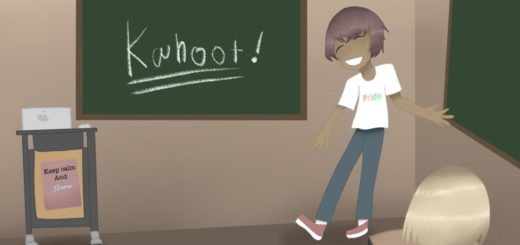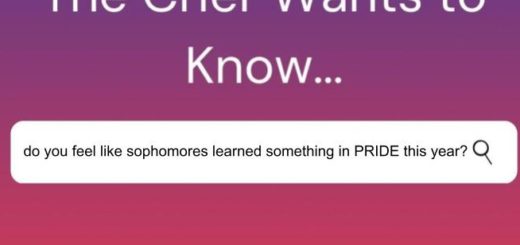Is PRIDE really necessary?
Picture a classroom with students sitting in silence, waiting for upperclassmen mentors to begin the district-mandated lesson. Students fiddle with their iPads while the mentors lecture about subjects such as internet safety, or Infinite Campus grades. Everyone seems anxious to leave for lunch, watching the clock as minutes pass by. This tedium is known as PRIDE, and some freshmen think it’s more of a lost cause than deserving of applause.
The new PRIDE program takes up half of freshmen’s lunch period, like the CAP program before it. Many upperclassmen who took three electives were never part of the CAP program because they didn’t have a study hall. But now, every freshman must undergo PRIDE instruction Monday-Thursday.
The spoon-feeding nature of the program is part of the problem. Olivia Woodruff, ‘20, believes that, “PRIDE is not necessary because students should be able to get to explore school themselves and not get forcefully introduced to things they might not find necessary.” For example, there was a full tour of athletic facilities, including the gym, which most students had seen by the time the tour came around.
Furthermore, a valuable chunk of free time is gone, which is an inconvenience, especially for those without a study hall. Manisha Muthu, ‘20, thinks Pride “takes away time from our lunch, and many students use lunch time to study, go to tutoring and more.” Because PRIDE takes up half a lunch periods, freshmen can’t utilize opportunities to further their education. Freshmen, as well as their upperclassmen mentors, may also use the time the program takes up to take a well-earned break.
Each Friday, there is a chorus of “No PRIDE today!” from those who intended to use the time for other means. This excitement clearly shows the level of dislike for PRIDE among freshmen.
On the other hand, Sophie Hyde, ‘18, says, “I think the freshmen have a very negative attitude and are ungrateful for this opportunity. It seems like they don’t realize that the mentors are willing to help and develop a relationship with them and that [the mentors] aren’t there to boss them around and some days might rather be at lunch, too.”
While this rings true, the mentors did choose to take part in the program. The freshmen did not. Some may find a relationship with an older student useful, but many seem to believe that a whole period to use in whatever way they choose would be better for their development.
Hyde also stresses the importance of PRIDE for teaching freshmen the positives of close relationships with teachers– something she wished she had been told as a freshmen. But from freshmen’s feedback, they haven’t learned much about such things. The class seems to focus mainly on getting acquainted with the school, as well as learning what to do in different situations they might face at school. This information is definitely helpful, but whether it is enough to fill up a semester is questionable.
But what’s the alternative?
One suggestion is that PRIDE should be put back in study hall, where only select students will receive instruction. Those students can receive the PRIDE instruction, and for other work, they will still have at least 25 minutes. Lunch, on the other hand, isn’t such a flexible time span, because students only have 25 minutes left to eat and work on schoolwork.
Other alternatives would be having PRIDE after school for anyone who chooses to receive the instruction, or perhaps holding PRIDE at less frequent intervals–maybe once or twice a week instead of four times.
Additionally, PRIDE should focus more attention on educating the freshmen on all the extracurriculars available to them. School should be seen as an opportunity rather than a chore, and simply being there the bare minimum of six hours a day isn’t using the opportunity to its max. There are such a wide variety of clubs and sports available that everyone has the privilege to try.
New students should be given a chance to realize all the extra options available to them. High school is, after all, is about exploring the interests and talents that set you apart in society. Every freshman needs to know that they are welcome and encouraged to be a part of the CHS community.
So, is PRIDE really as unnecessary as some freshmen seem to believe? No, it really isn’t. In fact, some kind of introduction to high school is essential. But if the program were to intrude a little less into students’ time, and instead urge students to explore all the opportunities presented in the school, it would make for a much better experience for freshmen in the long run.





Recent Comments